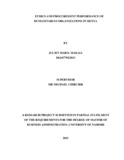| dc.description.abstract | This study was conducted to establish the relationship between ethics and procurement performance of humanitarian organizations in Kenya. The objective of the study was to establish the impact of ethics on procurement performance, the extent of practicing ethics and the challenges faced in implementing procurement ethics. The population of the study comprised the 70 humanitarian organizations registered by the NGO Council of Kenya. However, there was no sampling and instead a survey was conducted because the population is not too large. Primary data was collected through self-administered structured questionnaires. Percentages, frequency distributions, bar charts, means and standard deviations were used to analyse sections A, B and D of the questionnaire. Statistical Package for Social Sciences (SPSS) was used to explain the relationship between the independent and dependent variables in section C of the questionnaire. Competitive bidding, gifts, conflict of interest, negotiation, reciprocity, sharp practices, personal buying and confidentiality were used as the independent variables while procurement performance was used as the dependent variable. The study established that there exists a positive relationship between ethics and procurement performance. The study recommended that there is need to overcome the challenges of implementing procurement ethics in humanitarian organizations. For instance, lack of training, culture and political pressure. The study was faced by several limitations which included: lack of enough financial and non-financial resources, fear of victimization by management due to disclosure of information relating to ethics and that some organizations’ policies did not allow them to accept research questionnaires from students. Recommendations for further research included the need for more studies to be conducted in all humanitarian organizations in East Africa, other than in Kenya in order to give the researcher a wider experience of other ethical issues not addressed in this study. Similarly, another study could be conducted by linking the same independent variables with cost reduction as another measure of procurement performance. | en_US |

